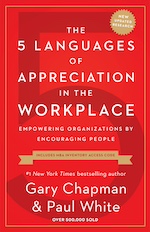Paul White Profile
Dr. Paul White is a psychologist, author, and speaker who "makes work relationships work." He has written for and been interviewed by the BBC News, Business Week, New York Times, CNN/Fortune.com, and the Washington Post.
Dr. White has spoken around the world and his expertise has been requested by PepsiCo, Microsoft, NASA, L'Oreal, Ritz Carlton, and numerous other multinational organizations. He is the coauthor of the best-selling, The 5 Languages of Appreciation in the Workplace, which has sold over 575,000 copies (written with Dr. Gary Chapman, author of The 5 Love Languages). They have developed practical ways for leaders and employees to communicate authentic appreciation leading to increased employee engagement, lower staff turnover, more positive work environments, and higher productivity.


